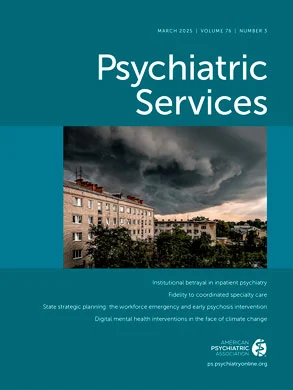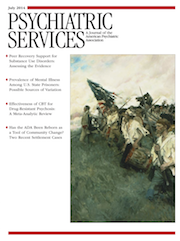Psychiatrist and Patient Responses to Suspected Medication Nonadherence in Schizophrenia Spectrum Disorders
Abstract
Objective
Methods
Results
Conclusions
Methods
Participants
Data and measures
Recruitment and interviews
Statistical analysis
Results
Participants
| Characteristic | N | % |
|---|---|---|
| Age (M±SD) | 39.8±12.1 | |
| Gender | ||
| Male | 121 | 57 |
| Female | 92 | 43 |
| Native language | ||
| German | 177 | 83 |
| Othera | 36 | 17 |
| Family status | ||
| Single | 144 | 68 |
| Married | 29 | 14 |
| Divorced or widowed | 40 | 19 |
| Education | ||
| <10 years | 89 | 42 |
| ≥10 years | 120 | 56 |
| Work status | ||
| Working | 31 | 15 |
| Student or in training | 5 | 2 |
| Unemployed or retired | 139 | 65 |
| Sheltered employment | 9 | 4 |
| Other | 29 | 14 |
| Duration of illness (M±SD years) | 11.8±9.0 | |
| Lifetime hospitalizations (M±SD) | 6.4±6.0 | |
| ICD-10 diagnosis code | ||
| F20 (schizophrenia) | 170 | 80 |
| F23 (schizophreniform disorder) | 2 | 1 |
| F25 (schizoaffective disorder) | 41 | 19 |
| Current treatment status | ||
| Voluntary | 165 | 77 |
| Involuntary | 48 | 23 |
| Previous experience with involuntary treatmentb | ||
| Yes | 104 | 50 |
| No | 105 | 50 |
| Legal guardianship | ||
| Yes | 105 | 49 |
| No | 108 | 51 |
Reasons for hospital admission
| Patient report | Physician report | |||
|---|---|---|---|---|
| Reasons cited | N | % | N | % |
| Symptoms | 162 | 76 | 196 | 92 |
| Social reasons | 34 | 16 | 30 | 14 |
| Suicidal attempt or suicidal ideation | 18 | 8 | 34 | 16 |
| Nonadherence | 9 | 4 | 29 | 14 |
| Drug abuse | 9 | 4 | 14 | 7 |
| Other | 29 | 14 | 25 | 12 |
Adherence before hospital admission
Actions taken to improve patients’ adherence
| Action takena | Example | N | % |
|---|---|---|---|
| Intensive talks with patient | 85 | 29 | |
| Psychoeducation for patients | 48 | 16 | |
| Intensified outpatient care | Specialized walk-in clinic | 21 | 7 |
| Prescription or offer of depot medication | 20 | 7 | |
| Talks with patient’s relatives | 20 | 7 | |
| Psychosocial interventions planned | Day treatment center | 19 | 6 |
| Interventions regarding housing | 18 | 6 | |
| Legal guardianship | Initiation of guardianship; meeting with guardian | 13 | 4 |
| Psychotherapeutic interventions | 9 | 3 | |
| Shared decision making | 5 | 2 | |
| Psychoeducation for relatives | 3 | 1 | |
| Other | 33 | 11 |
Setting-related predictors of use of adherence measures
Patient-related predictors of use of adherence measures
Physicians’ reasons for not using adherence measures
| Measure and reasona | N | % |
|---|---|---|
| Depot medication (N=136) | ||
| Good adherence with oral drug | 45 | 33 |
| Patient’s drug not available as depot | 38 | 28 |
| Patient refused depot injection | 23 | 17 |
| Depot inappropriate for first psychotic episode | 13 | 10 |
| Forgotten or not yet discussed | 8 | 6 |
| Inappropriate treatment phase | 10 | 7 |
| Side effects under previous depot therapy | 7 | 5 |
| Other | 13 | 10 |
| Psychoeducation for patients (N=83) | ||
| No groups available | 29 | 35 |
| No group while patient on the ward | 9 | 11 |
| Patient had participated before | 14 | 17 |
| Not necessary because first-episode patient | 12 | 14 |
| Patient refused | 9 | 11 |
| Patient too ill | 6 | 7 |
| Not yet participated, but participation planned | 5 | 6 |
| Other | 3 | 4 |
| Psychoeducation for relatives (N=133) | ||
| No groups at all available | 33 | 25 |
| Patient has no relatives | 35 | 26 |
| Barriers for relatives (time, language) | 17 | 13 |
| Relatives do not want to participate | 16 | 12 |
| Patient does not want relatives to be involved | 10 | 8 |
| Relatives have already participated | 6 | 5 |
| Relatives have mental illness | 8 | 6 |
| Other | 15 | 11 |
| Arrangement of follow-up (N=138) | ||
| Specific discharge day not yet known | 55 | 40 |
| Follow-up physician unknown | 18 | 13 |
| Patient makes own arrangement | 18 | 13 |
| Referral to day clinic | 18 | 13 |
| Forgotten or not yet done | 16 | 12 |
| Patient will get an appointment automatically | 12 | 9 |
| Other | 5 | 4 |
Barriers to implementation of adherence-enhancing measures
| General barrier | N | % |
|---|---|---|
| Patient does not accept adherence measure, has poor insight about mental illness | 74 | 37 |
| Patients’ relatives do not accept adherence measures | 8 | 4 |
| Poor therapeutic relationship prohibits implementation | 7 | 3 |
| Limited hospital resources (lack of time, staff shortages) | 68 | 34 |
| Limited outpatient resources (lack of time, staff shortages) | 24 | 12 |
| Neglect or laxness of physician | 21 | 10 |
Discussion
Physicians’ estimate of nonadherence
Implementation of adherence-enhancing measures
Are the findings generalizable to other health systems?
Opportunities to improve management of nonadherence
Limitations
Conclusions
Acknowledgments and disclosures
Supplementary Material
- View/Download
- 17.52 KB
References
Information & Authors
Information
Published In

Cover: The Nation Makers, by Howard Pyle 1903. Oil on canvas. Collection Brandywine River Museum of Art, purchased through a grant from the Mabel Pew Myrin Trust, 1984.
History
Authors
Metrics & Citations
Metrics
Citations
Export Citations
If you have the appropriate software installed, you can download article citation data to the citation manager of your choice. Simply select your manager software from the list below and click Download.
For more information or tips please see 'Downloading to a citation manager' in the Help menu.
View Options
View options
PDF/EPUB
View PDF/EPUBLogin options
Already a subscriber? Access your subscription through your login credentials or your institution for full access to this article.
Personal login Institutional Login Open Athens loginNot a subscriber?
PsychiatryOnline subscription options offer access to the DSM-5-TR® library, books, journals, CME, and patient resources. This all-in-one virtual library provides psychiatrists and mental health professionals with key resources for diagnosis, treatment, research, and professional development.
Need more help? PsychiatryOnline Customer Service may be reached by emailing [email protected] or by calling 800-368-5777 (in the U.S.) or 703-907-7322 (outside the U.S.).
